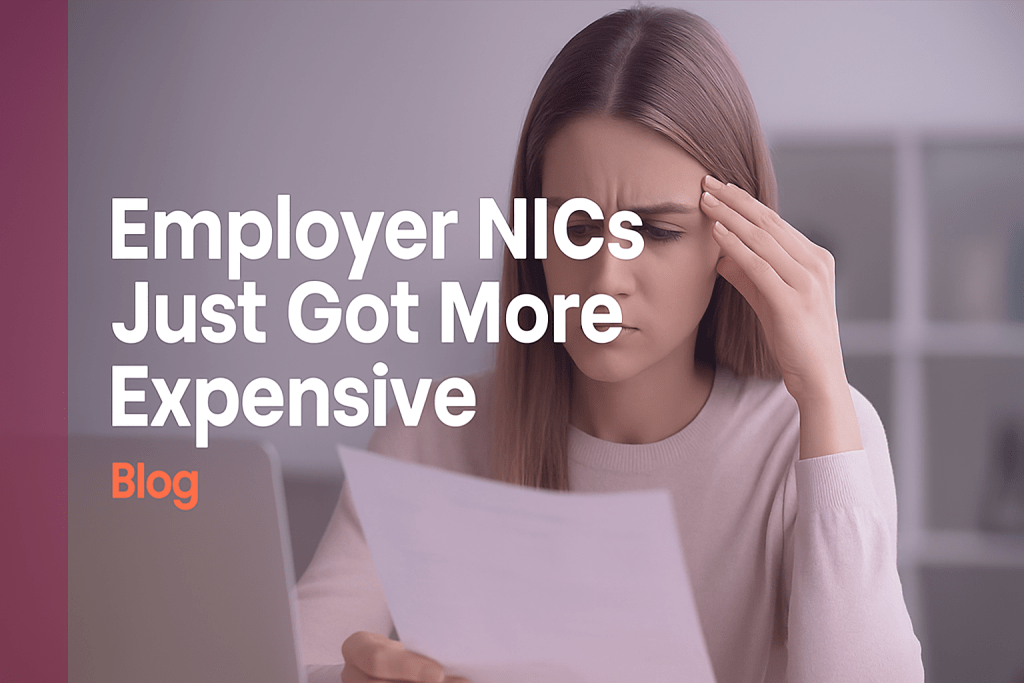HMRC Payrolling Benefits Delay (BiKs)

If you’ve heard that HMRC is changing how employee benefits are taxed—you’re right.
If you’ve heard that HMRC is changing how employee benefits are taxed—you’re right.
But here’s the good news: the most disruptive part of that plan has just been pushed back to April 2027.
The requirement to payroll Benefits in Kind (BiKs) is coming—but the transition is now slower. That gives you time to prepare, especially if you’re still managing payroll manually.
The Employment Rights Bill Is Here

If you employ staff in the UK, take note: the rules just changed.
The Employment Rights Bill, introduced in April 2025, marks one of the most significant overhauls to UK workplace law in over two decades. While media coverage has focused on “zero-hours bans” and “flexible working reforms,” the bigger question is:
What does this mean for you—your business, your contracts, and your payroll?
Employer NICs Just Got More Expensive

If you run a UK business, your payroll costs likely just increased.
In April 2025, two significant changes to Employer National Insurance Contributions (NICs) came into effect. And for many small businesses, the impact won’t be minor—it could mean paying hundreds more per employee each year.
Here’s what changed, why it matters, and what you can do to protect your bottom line.
Director’s Salary Guide for 2025/26

With new tax changes for 2025/26, choosing the right director’s salary is more important than ever. Our guide breaks down the best salary options to maximise tax efficiency, reduce costs, and optimise your take-home pay—read on to make the right choice for your business!
Employment Allowance 2025:Your Guide to the New Changes

Big changes are coming to Employment Allowance in April 2025, offering businesses increased relief on National Insurance costs. The allowance will more than double to £10,500, and the previous cap preventing larger employers from claiming will be removed. These changes come alongside rising NIC rates, making it crucial for businesses to plan ahead.
Find out if you’re eligible, how much you could save, and the simple steps to claim. Don’t miss out—prepare now to maximise your payroll savings!This blog explores the new rates, their implications for businesses, and practical strategies to prepare effectively for the upcoming changes.
This guide explains how salary sacrifice works, its benefits, and how your business can leverage it to stay compliant and cost-efficient.
Small Employers’ Relief: Important Changes for 2025-26

Great news for small businesses! From April 2025, the Small Employers’ Relief compensation rate will increase to 8.5%—nearly triple the current rate. This means eligible employers can reclaim 100% of statutory parental payments plus an extra 8.5%, improving cash flow and reducing financial strain.
If your business paid less than £45,000 in Class 1 NICs, you could benefit. Learn how to check your eligibility, claim the relief, and maximise your savings.
Adapting to the New National Minimum and Living Wage Rates in April 2025

The National Minimum Wage (NMW) and National Living Wage (NLW) are set to rise in April 2025, bringing important changes for UK businesses. These adjustments aim to ensure fair pay for workers across different age groups, but they also present challenges for employers managing payroll and budgets.
This blog explores the new rates, their implications for businesses, and practical strategies to prepare effectively for the upcoming changes.
This guide explains how salary sacrifice works, its benefits, and how your business can leverage it to stay compliant and cost-efficient.
Navigating Rising NIC Costs: Cash Flow Strategies for 2025

The April 2025 changes to National Insurance Contributions (NICs) are set to increase costs for businesses across the UK. These shifts, including higher employer NIC rates and lowered thresholds, will require careful financial planning. To stay resilient, proactive cash flow management is essential for maintaining stability and navigating this period of increased expenses.
This guide explains how salary sacrifice works, its benefits, and how your business can leverage it to stay compliant and cost-efficient.
Salary Sacrifice: Strategies to Reduce Your NIC Burden in 2025

As April 2025 approaches, UK businesses are preparing for significant changes to National Insurance Contributions (NICs) that will increase payroll costs. While these changes may seem challenging, there’s a silver lining: strategic use of salary sacrifice arrangements can help businesses manage their NIC burden effectively.
This guide explains how salary sacrifice works, its benefits, and how your business can leverage it to stay compliant and cost-efficient.
April 2025 NIC Changes: How Employers Can Prepare

Big changes are on the horizon for Employer National Insurance Contributions (NICs), and businesses need to act now to stay ahead. Starting in April 2025, these updates will directly impact payroll costs, cash flow, and overall financial planning.
At Intelligent Payroll, we understand that navigating such changes can be daunting. That’s why we’ve created this guide to help you break down the new rules, understand their impact, and prepare your business for the months ahead.
